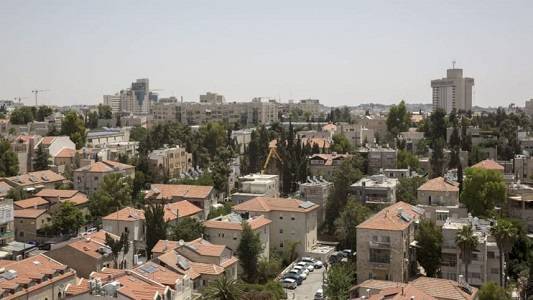- | Thursday, 19 July 2018 14:08

A company whose owners include Shlomo Dery, who is brother to the interior minister and also deputy chairman of the Jewish National Fund, has bought the lease on a residential area of Jerusalem from the Catholic Church.
Gan Rehavia contains about 70 apartments. The current lease expires in 19 years, after which the land and all the apartments on it will become the company’s property.
As a result, if the residents haven’t sold their homes by 2035, they will be forced to vacate without receiving any compensation.
The deal is the latest in a series of similar deals under which commercial companies have bought up leases in Jerusalem from various churches.
Large parts of central Jerusalem are built on church-owned land that was leased for 99 years in the mid-20th century, and many of those leases will expire in the coming decades.
Two weeks ago, for instance, Haaretz reported that the 32 families who live in Rosh Rehavia, another section of Rehavia, are being forced to sell their apartments for about half of their market value because the lease has been sold to private entrepreneurs. Their lease expires in 2034.
It now turns out that the lease for Gan Rehavia, which is on the other side of the Ratisbonne Monastery from Rosh Rehavia, has been sold to the same entrepreneur, Moshe Idan. But this time, Idan has partners in the venture, one of whom is Shlomo Dery.
Over the coming decades, hundreds of families in central Jerusalem will face similar problems. The churches, mainly the Catholic and Greek Orthodox ones, own land in many Jerusalem neighborhoods, including Rehavia, Talbiyeh, Nayot and Rassco.
In most cases, the 99-year leases on this land were signed in 1950 or 1951, so they will expire in another 33 or 34 years. But the land around the Ratisbonne Monastery was leased in the 1930s, so residents of this area are the first to face the problem.
The churches don’t want to deal with the problem themselves, so they are instead selling the leases to private entrepreneurs, usually for another 200 years.
For instance, most of the land in Talbiyeh and Nayot was sold to a group of investors headed by the Ben-David family. The leases for Givat Oranim were sold to a group of anonymous investors, and the Rosh Rehavia and Gan Rehavia leases were sold to Idan and his partners.
Dery, an attorney who specializes in real estate, was recently questioned by the police under caution —meaning as someone who might be charged with a crime — about properties he bought from his brother, Interior Minister Arye Dery. Shlomo Dery owns 350 of the 1,185 shares in Idan’s Ezrat Halovim company, which bought the Gan Rehavia lease.
According to the website of the Israel Tax Authority, the company paid 28 million shekels ($7.2 million) for the lease. The site in question, located at the corner of Narkiss and Shmuel Hanagid streets, holds three buildings that contain some 70 apartments.
The residents are now being told they must either sell their apartments to the company for half their market value, or buy the lease from the company at a similar price. If they do neither, they will be forced to vacate with no compensation in another 19 years.
“There’s approximately 20 years to go, which means that every year, the residents are losing about five percent of the value of their apartment,” said a source who is knowledgeable about the terms of the deal and who spoke on the condition of anonymity.
“It would pay for the residents to sell and buy an apartment in Kiryat Yovel,” a much less pricey and less prestigious neighborhood than Rehavia.
The residents, like those in similar situations elsewhere in the city, are hoping that either the state or the JNF, which was involved in many of the original leases, will ultimately do something to help them out of their fix. One possibility is a law that would give residents some property rights to their apartments.
But everyone involved in the issue agrees that the more time passes, and the more private entrepreneurs take over the churches’ leases, the less likely it is that the state will do anything of the sort.
“Nobody knows what will happen,” said one Gan Rehavia resident, who asked to remain anonymous. “I’m not optimistic, but maybe there’s a chance that toward the end of the lease, something will happen. Maybe the state will pass a law. The problem is that the entrepreneurs have property rights, and they’ll fight for them.”
A woman who has lived in Gan Rehavia for decades, said all the families are in a panic. “Nobody imaged things would come to such a pass,” she said. “I’m less worried, because in another 20 years, who knows if I’ll still be here. But there are young people here, and they’re worried.”
Nir Hasson
Haaretz
17-07-2018




